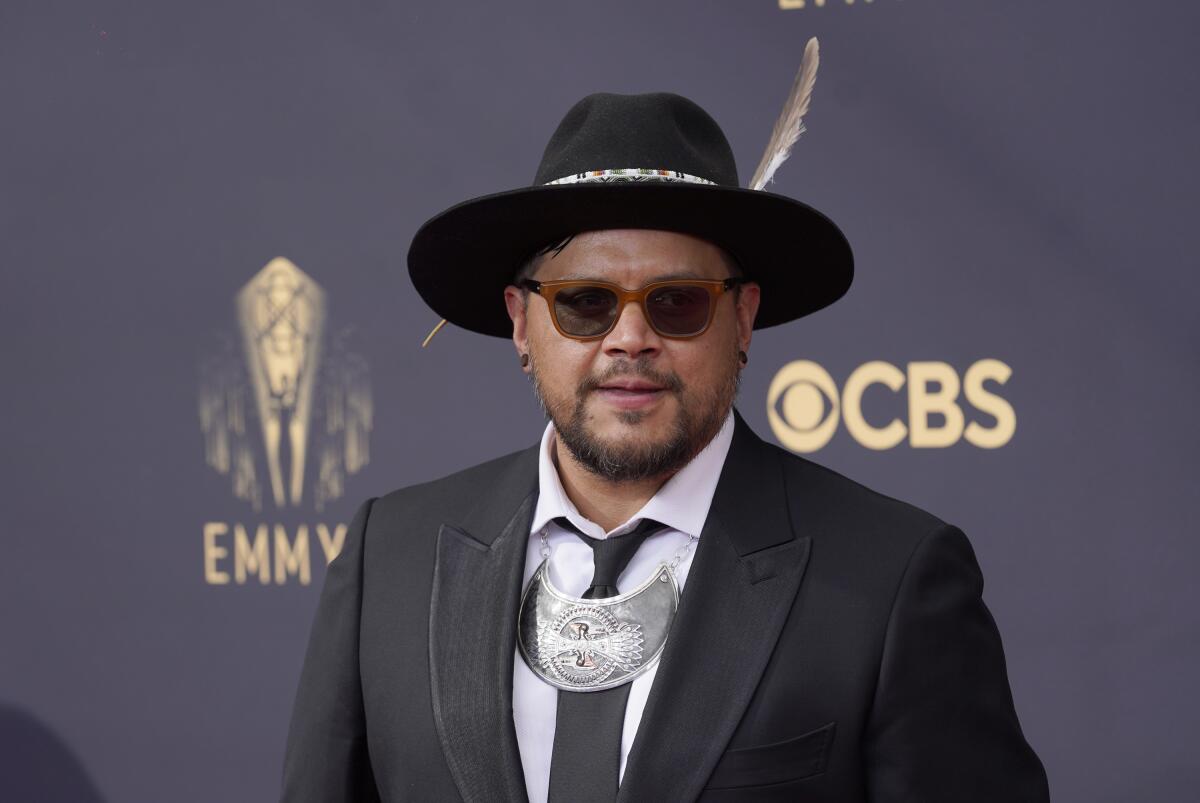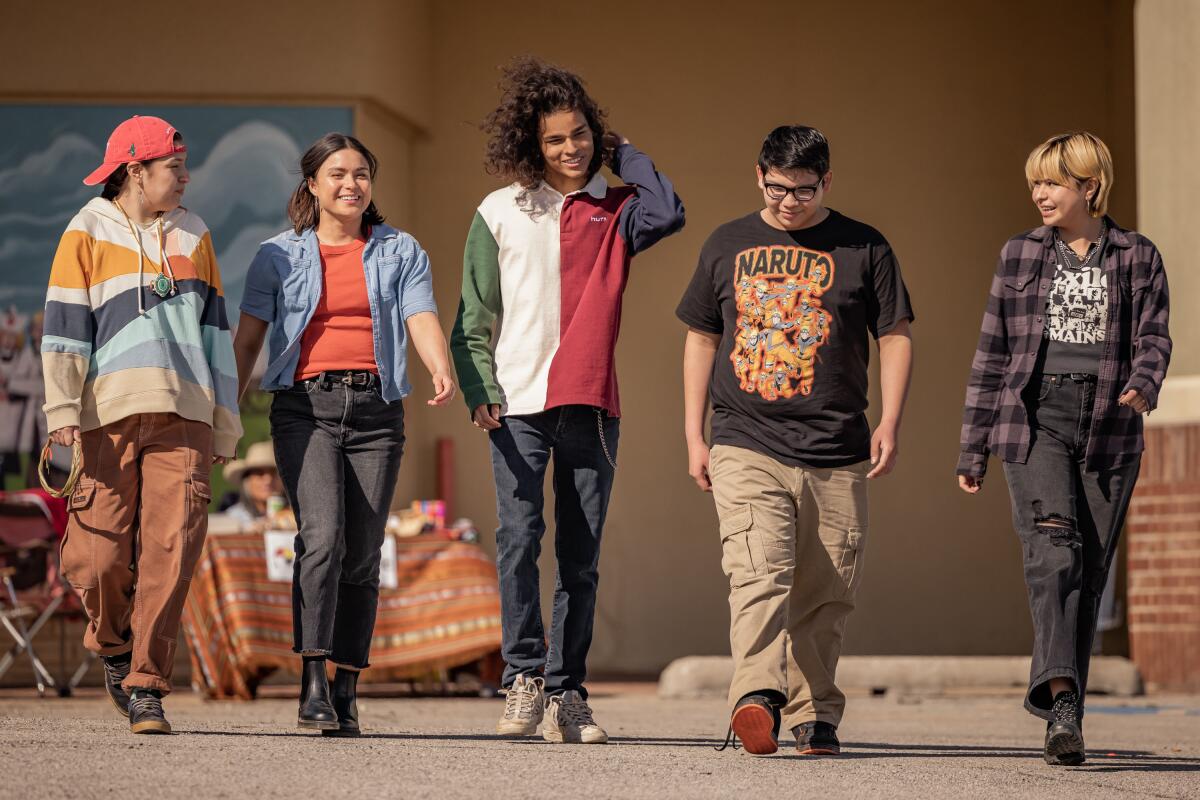Three seasons, three years, 28 episodes and at last, “Reservation Dogs” has an Emmy nomination for comedy series.
And that’s not all. The FX show, which began streaming on Hulu in 2021, received three additional nominations on Wednesday, including a lead acting nom for D’Pharaoh Woon-A-Tai, who plays Bear Smallhill on the groundbreaking coming-of-age series. “Reservation Dogs” follows four Indigenous teenagers, played by Devery Jacobs, Paulina Alexis, Lane Factor and Woon-A-Tai, who live in rural Oklahoma and deal with the aftermath of their friend’s suicide.
But as much as the series is about a group of teenagers, it’s also about the community and the elders that surround them and guide them. Among the show’s recurring cast were Zahn McClarnon, Gary Farmer, Wes Studi, Lily Gladstone, Kaniehtiio Horn and many more actors of Indigenous heritage who have long worked in Hollywood and in Canadian TV and film. And this year’s nominations were a reflection of the changes in the industry leading to a banner year for Native American representation, with actors Kali Reis of “True Detective: Night Country” and Gladstone of “Under the Bridge” also earning honors.
Co-creator and showrunner Sterlin Harjo, who spoke with The Times on Wednesday after the Emmy nominations, said that spirit of community was reflected in the show and on set, particularly when it came to filming the series finale, which streamed in September 2023.
“The whole crew and everyone — my family and the community — was there for the last episode,” Harjo said. “It very much reflected the episode [and] our experience making it because there were a lot of hugs and tears, and it was truly, really beautiful to all be together.”
And that community lives on even now that the show has ended, on a text thread, where some of the chatter about the Emmys erupted, including Woon-A-Tai’s nomination. Harjo said he saw the actor very recently. “He actually stopped by my house a couple days ago; he happened to be in Tulsa, [Okla.]. I gave him a call and told him congratulations,” Harjo said.
In this edited conversation, Harjo spoke about the show’s nominations, why it was important to him to give other Indigenous artists opportunities on “Reservation Dogs,” and how the show and its universe will live on.

Sterlin Harjo at the Emmy Awards in 2021.
(Chris Pizzello / Invision / AP)
Hi, Sterlin. Congratulations. How are you feeling about the show’s nomination today? It feels like it has been a long time coming.
It’s been a crazy day. It’s been nothing but text messages and calls all day. And I’ve also been working. I forgot and I wasn’t watching [the announcement]. I wasn’t going to watch it anyway because we always don’t get nominated. But I got like 30 texts in a row at the same time when D’Pharaoh got nominated … and they kept coming after that, so it was pretty cool.
What has it been like since the series wrapped? Do you miss it?
Around this time, around springtime, I think we all felt the show’s absence, because the last three years we’ve been shooting or starting to shoot, and come in and everybody gathered in Oklahoma in Okmulgee. Around that time [this year], we all really felt it, and missed the family getting together and making a cool show.
I’ll admit, I sobbed like a baby when I watched the finale. It felt like a full-circle moment for the characters, who had been on a journey of self-reflection for the past three seasons. Can you tell me about what it was like to shoot it and how you felt?
It was midway through writing the series when I realized that could be the end, and it would be a good end. And then once I thought of that, I couldn’t quit thinking about it. I brought it up to everyone and everyone was nervously in agreement. And then we did it. We shot that episode, it was so fun. The shoot was hard that year. [But] it was something really special.
One thing that I started doing in Season 1, there’s this practice with Native cultures where we blanket someone. It’s usually a Pendleton blanket or a Native blanket of some sort, where you honor this person by wrapping them in the blanket, thanking them. And so I started doing that. Even on the pilot, I did that with the actors, and then with each director that would come in. We would wrap them out at the end and I would blanket them, and different people within the seasons got [a blanket]. At the end, when we were shooting the big finale, I got my assistant and a couple of other people to help me, but we snuck off and basically bought a lot of blankets … and [for] a lot of the locals, it was really meaningful to them because they were blanketing these people that had come in and become family. But there were 150 or 200 blankets, and we surprised everyone and did that at the end. It was just really meaningful.

The cast of “Reservation Dogs”: Paulina Alexis, left, Devery Jacobs, D’Pharaoh Woon-A-Tai, Lane Factor and Elva Guerra.
(Shane Brown / FX)
You mentioned the directors — we spoke to Danis Goulet and Blackhorse Lowe for Season 3, and one of the things they said was what an opportunity it was for them to work with this collaborative, creative community.
It was one of my favorite things, being able to give people opportunities, like friends of mine that … are really talented filmmakers. They were in the same boat as me, where we weren’t getting a lot of opportunities inside the industry. To be able to change that with one show was one of my favorite aspects of being a showrunner and creating the show.
What should the decision–makers in Hollywood take away from this now that your show’s been nominated?
People crave different stories, people crave new, fresh stories, people crave new faces, and [they] are willing to give people opportunities to tell their stories from their perspective. If you do that [and] you support that, like FX has, you’ll benefit from it. You can do some amazing stuff. “Reservation Dogs” was kind of a new thing [that] broke a lot of barriers. When you’re doing that, you don’t necessarily always get recognized in real time. It’s something that you have to reflect on to really understand what changed. … You have to be in the future to reflect on what those things did. I always felt like “Rez Dogs” is timeless, but people will always recognize it as this thing that broke a lot of barriers.
Is there anything you‘d like to say to Native artists out there who want to break into TV or filmmaking?
It should be very encouraging, obviously, with all of the Indigenous actors and shows that were … nominated. It should be very encouraging for everyone who is thinking about stepping foot into the film and TV world. Now’s the time. It’s there, we’re holding the door open, so come on through.
You’ve talked about doing a spinoff. Do you think we’ll see anything from the “Rez Dogs” universe in the near future?
Not in the near future but there’s going to be something. I have a lot of ideas for the future. But I made a new pilot [“The Sensitive Kind,” for FX] and you might see some Easter eggs in that as well.